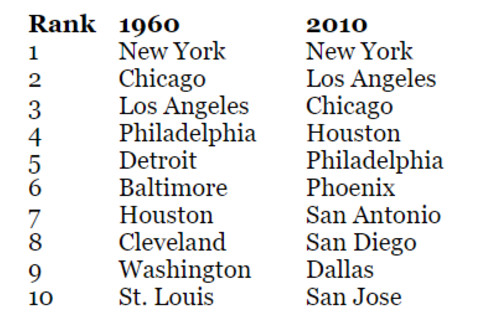I've never watched Mad Men, but I really can't help but hear all about the show. One thing that has struck me about the change from then, ~1960, to now, ~2010, is the alignment of quantitative demographic trends with impressionistic cultural ones. The 1970s were a disaster for the old urban order. Below are the top 10 cities by population in 1960 and 2010.

The rise of the "Sun Belt", housing bubble notwithstanding, is a real and awesome phenomenon. Below the fold I've taken some demographic trend data for the top 10 cities of 1960. The first two panels show raw population data. The second two panels show the decade-to-decade change in population in terms of multiples (i.e., 1.2 for 2010 means that the population in 2010 was 1.2 times that in 2000).
For me the biggest surprise is how much the trajectory of Chicago resembles stereotypical "Rust Belt" cities. Unlike New York City Chicago lost population in the aughts. In some ways New York City is sui generis. I went through the precipitous near collapse in the 1970s, just as the smaller cities of the Heartland, but over the past few decades it has refashioned itself, exhibiting a demographic vigor to match Los Angles on the West coast. A second surprise is Philadelphia's robustness. Unlike the Midwestern cities it seems to have developed some "stabilizers."
More starkly, observe the rate of change in the 1970s. We often reflect upon the cultural shifts in the 1960s, the first half of which are arguably part of the long 1950s. But chaos of the late 1960s bore fruit over the 1970s, and echoed down into the 1980s. Though the worst of the decline was over by the 1980s, a pall of decline still hung over much of the decade (e.g., "Japan Inc.") due to the experiences of the 1970s, Ronald Reagan's robust counter-narrative notwithstanding. And the great urban revival of the 1990s clearly leveled off in the last decade.













